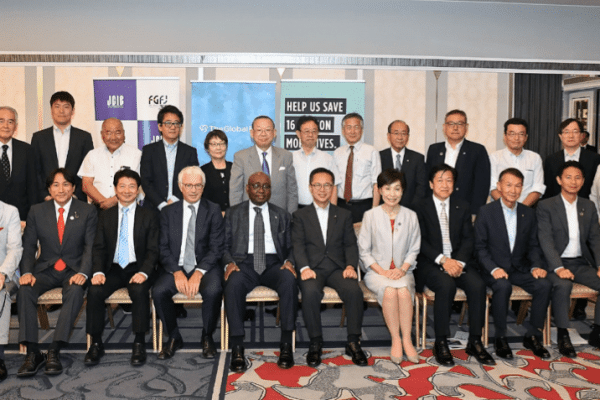On August 28, 2019, Global Fund Board Chair Donald Kaberuka and Executive Director Peter Sands met with nine members of the FGFJ Diet Task Force to discuss Japan’s leadership role in the fight against the three diseases. The meeting also convened members of FGFJ’s advisory board as well as Osamu Kunii, head of strategy, investment, and impact at the Global Fund, who had recently published a book on his experiences at the Global Fund and how the organization achieves its impact through various public and private partnerships with Japan.
Dr. Kaberuka and Mr. Sands were in Japan to attend the Seventh Tokyo International Conference on International Development (TICAD7), using the opportunity to speak with different African leaders and heads of state about the importance of domestic financing to achieve shared health goals. Mr. Sands highlighted the critical role Japan has played in building momentum towards the Global Fund’s 6th Replenishment Round, having made the first pledge by a major country earlier this summer in the amount of US$840 million, or 1 million lives saved. He emphasized how the Global Fund is supporting country efforts to achieve universal health coverage (UHC), an overarching global health priority for Japan, recognizing that strong health systems are necessary to deliver results in the Global Fund’s disease-specific mandate. He also underscored how staying on top of the world’s leading infectious disease killers—HIV/AIDS, tuberculosis, and malaria—can in turn help accelerate progress toward UHC by reducing the burden on nascent and overwhelmed health systems.
Donald Kaberuka followed up by pointing out how TICAD has evolved from a conference “where it was rich countries helping poor countries” to a partnership where African and Japanese stakeholders work together to solve global challenges. He emphasized how TICAD has fostered relationships contributing to approximately 800 Japanese companies currently operating on the African continent. The number of heads of state present in Yokohama for TICAD7 is a testament to the spirit of cooperation Japan has cultivated with African countries, and Dr. Kaberuka described the leadership role that Japan has long played through hosting the G8 Summit in Okinawa that was the birth place of the Global Fund, as well as through providing a legacy of intellectual leadership in how the Fund operates.
These initial remarks were followed by a lively discussion on how the Global Fund measures its impacts and the high returns to local economies that are widely cited around its health investments in low-income countries, as well as on concrete risks for countries like Japan if current efforts to step up the fight against the three diseases are not adequately funded and seen through.
For more information on this event, please visit the FGFJ Website.

